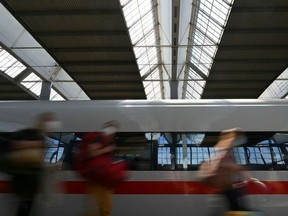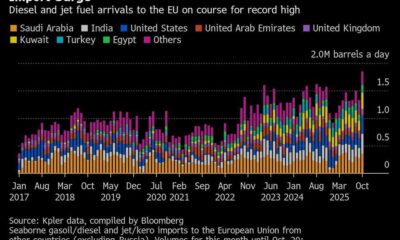Technology
European Commission Unveils Ambitious High-Speed Rail Plans by 2040

The European Commission has announced a significant initiative aimed at reducing transportation carbon emissions across the continent. On Wednesday, the Commission revealed plans to expand high-speed rail connections linking EU capitals by 2040. This involves both upgrading existing rail lines and constructing new ones, which promises to enhance connectivity and encourage sustainable travel.
Under the proposed plan, travel times between key cities will dramatically decrease. For instance, a journey from Berlin to Copenhagen could be reduced from seven hours to just four. Similarly, the travel time from Athens to Sofia is expected to decrease from nearly 14 hours to six. Additionally, new routes will be introduced, including a connection from Paris to Lisbon.
Investment and Collaboration for a Sustainable Future
To facilitate these ambitious changes, the European Commission is working to eliminate barriers to cross-border rail travel. This includes harmonizing ticketing systems, with a legal proposal anticipated early next year. Furthermore, the Commission aims to foster competition among rail operators to lower ticket prices.
To support this extensive project, EU member states, rail operators, and financial institutions will collaborate to address the significant investment needs, projected to be at least €345 billion by 2040, rising to over €500 billion by 2050. Alberto Mazzola, head of the Community of European Railways (CER), described the plan as “an important first step” toward creating a cohesive and integrated transcontinental rail network.
Efforts to unify rail links across Europe have encountered challenges in the past. Notable setbacks include the unsuccessful relaunch of night trains between Paris and Berlin and complications with the inaugural run of a new Brussels to Venice service, which faced issues at the Italian border in February.
Commitment to Sustainable Fuels
In conjunction with the high-speed rail initiative, the European Commission has also announced plans to increase the production of sustainable fuels for aviation and maritime transport. This initiative is supported by nearly €3 billion in EU funding and aims to transition from pilot projects to large-scale production of low-carbon alternatives to kerosene, particularly through the use of e-fuels generated from decarbonized electricity.
The aviation and maritime sectors have struggled to advance due to substantial investment requirements, estimated at €100 billion across the EU by 2035. The environmental advocacy group Transport and Environment has praised the plan, calling it a series of “promising steps” toward decarbonizing both industries. The group emphasized the urgency for the EU to follow through on these commitments to maintain its technological leadership in the production of e-fuels.
As the European Commission moves forward with these initiatives, the focus remains on enhancing connectivity, reducing carbon emissions, and fostering sustainable development across the continent.
-

 World4 months ago
World4 months agoScientists Unearth Ancient Antarctic Ice to Unlock Climate Secrets
-

 Entertainment4 months ago
Entertainment4 months agoTrump and McCormick to Announce $70 Billion Energy Investments
-

 Lifestyle4 months ago
Lifestyle4 months agoTransLink Launches Food Truck Program to Boost Revenue in Vancouver
-

 Science4 months ago
Science4 months agoFour Astronauts Return to Earth After International Space Station Mission
-

 Technology2 months ago
Technology2 months agoApple Notes Enhances Functionality with Markdown Support in macOS 26
-

 Top Stories4 weeks ago
Top Stories4 weeks agoUrgent Update: Fatal Crash on Highway 99 Claims Life of Pitt Meadows Man
-

 Sports4 months ago
Sports4 months agoSearch Underway for Missing Hunter Amid Hokkaido Bear Emergency
-

 Politics3 months ago
Politics3 months agoUkrainian Tennis Star Elina Svitolina Faces Death Threats Online
-

 Politics4 months ago
Politics4 months agoCarney Engages First Nations Leaders at Development Law Summit
-

 Technology4 months ago
Technology4 months agoFrosthaven Launches Early Access on July 31, 2025
-

 Top Stories2 weeks ago
Top Stories2 weeks agoFamily Remembers Beverley Rowbotham 25 Years After Murder
-

 Top Stories6 days ago
Top Stories6 days agoBlake Snell’s Frustration Ignites Toronto Blue Jays Fan Fury





















